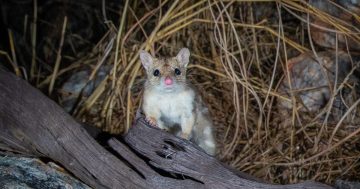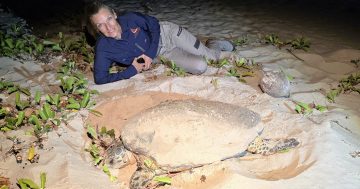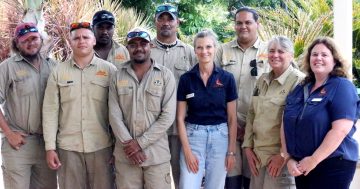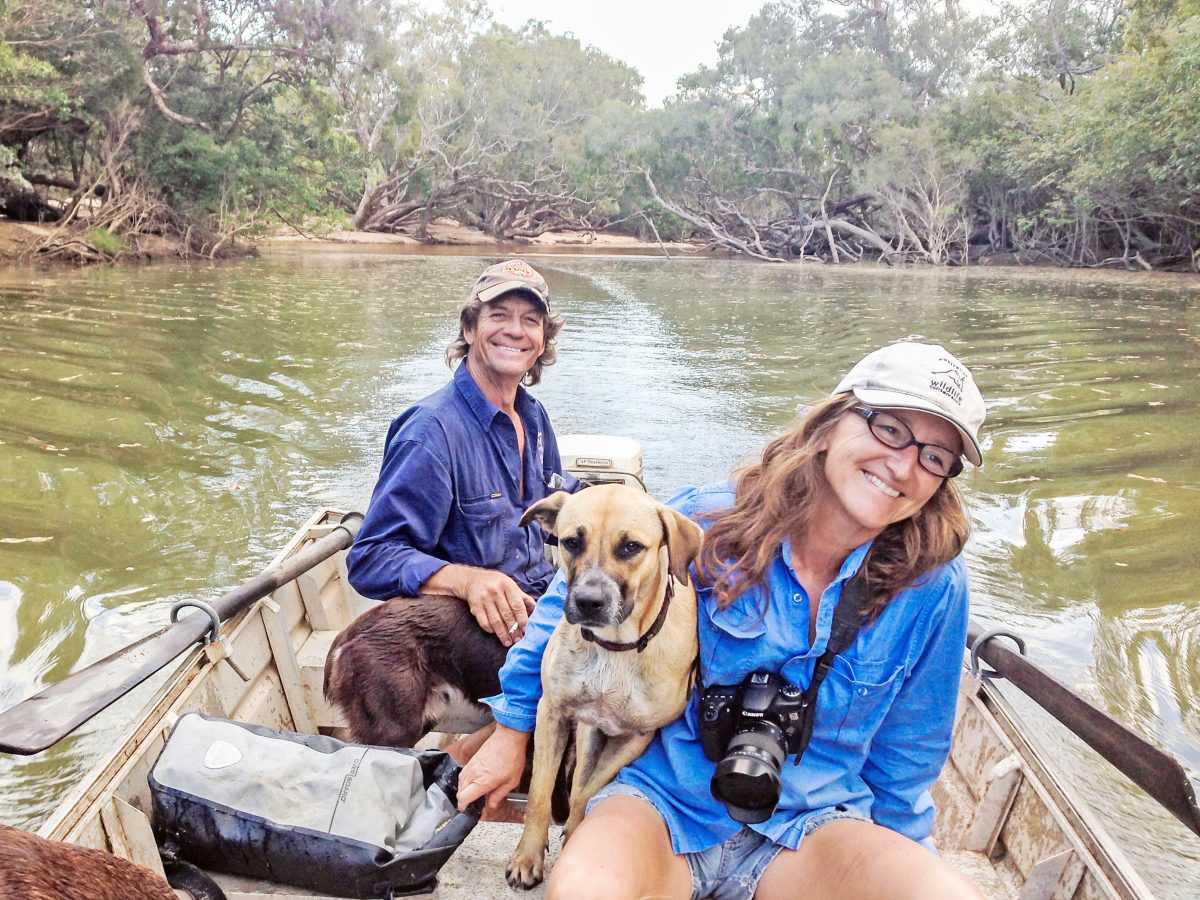
Graham and Sally in their element with the dogs in the tinny. They were also involved with the Wenlock Catchment Management Group.
AFTER a decade of hard work on the Cape, much-loved Piccaninny Plains managers Graham Woods and Sally Gray are hanging up their boots.
When the couple took over management of the derelict cattle station for the Australian Wildlife Conservancy in 2013, it was “out of control” with tens of thousands of feral animals running riot and a barely liveable dwelling.
“We’ve spent years bringing it up to scratch and now it’s one of the most beautiful properties in the Cape,” Graham said proudly.
“It’s a total lifestyle job, 24 hours a day.
“For five months of the year you’re completely cut off from the outside world, then there’s the heat – for some people it was just way out of their comfort zone.”
But the lifestyle suited the hardworking duo, who brought the perfect combination of conservation knowledge from Sally and stock and machinery know-how from Graham that has seen the property flourish.
“We’re a good fit for this place,” he said.
“I’ve got no background in conservation, I’m just an old ringer with a broad spectrum of skills.”
Sally agreed, saying Graham’s experience, from running cattle properties to commercial fishing and mine work, had been invaluable.
“You have to be incredibly multi-skilled, you have to be everywhere, fix everything, run everything, and it’s not a conservation job in that regard,” she said.
“You have to be able to drive a grader, fix electronics, fix the machinery.”
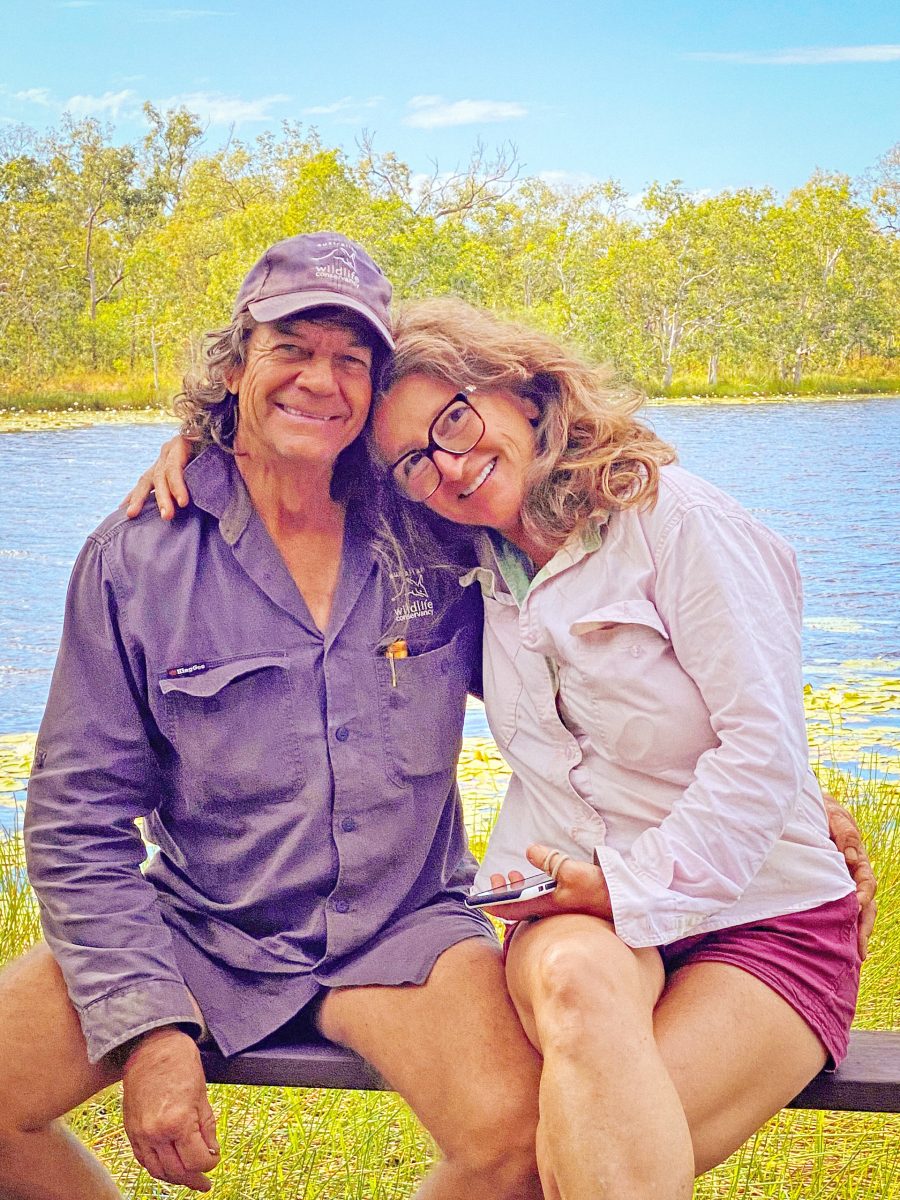
Graham and Sally are leaving Piccaninny Plains after a decade of management.
Among the couple’s proudest achievements was the restoration of 1200 hectares of grassland that was being invaded by bohemia trees.
“Those plains, they were literally gone,” Graham said.
“They would have been calling this place Piccaninny Scrub, so that’s going to be our legacy and that will last way beyond us.
“We’re very thankful to AWC for giving us the opportunity, especially me, because this is my last job and to be able to go out putting something like this back into the land, that’s something really nice.
“All my life the land has been my living, and now to give my heart and soul back to it is special, but it’s time to hand it over to young eyes.”
During their tenure, 2000 feral horses, 11,000 feral cattle and countless feral pigs have been removed from the 490,000 acre property.
“We have 70 wetlands and lagoons all classified as of national significance,” Sally said.
“We protect 27 threatened species, and we’ve got really iconic species like the riflebird and spotted cuscus and our wetlands are important migratory habitat for birds, which is why the feral control is so important.”
The station is still an operational cattle property, although stock has been reduced to more manageable numbers, with only 20,000 acres being used for cattle and the remaining 470,000 acres kept for conservation.
Over the years there have been too many stories to write about, including dingoes sheltering in the house with them through cyclones.
However, three special stories stand out for the couple.
One was an encounter of the slithering kind that would have had many packing their bags straight away.
“We had a season a couple of years ago when we had death adders in the house probably twice a week – it was just an influx. We would just get rid of one and another one would be there, and not the same one, a different one,” Sally said.
Another standout was a much cuter and more welcome, but equally wild, house guest.
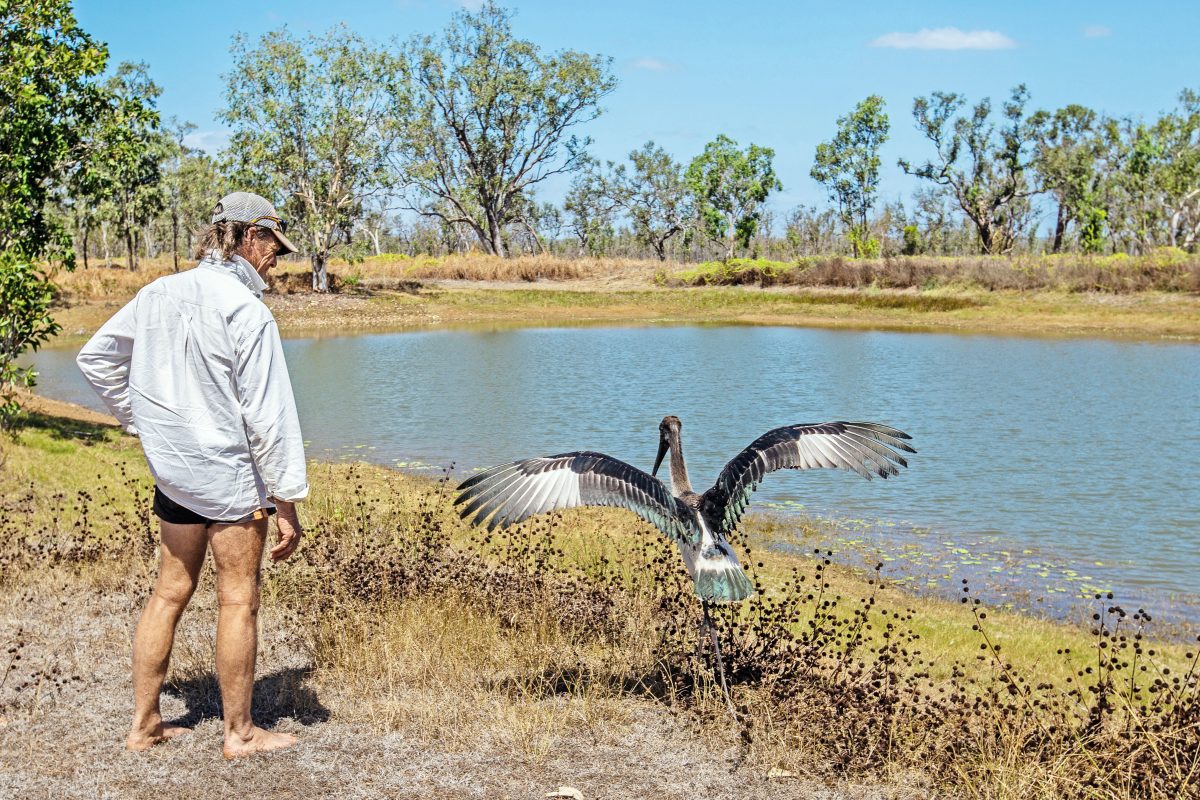
Graham with Fred the jabiru – who was rescued by a Weipa family – on Piccaninny Plains.
“He was an adolescent jabiru named Fred who was released at Piccaninny, but he kept following Sally around,” Graham said.
“You’d look up and he’d be sticking his head through our office window or in the kitchen stealing dinner.
“It used to be so funny, for a wild bird, you’d look out the back and the two dogs would be lying down and Fred would literally be lying down next to them.
“Then one day he sort of matured, he had mastered flying and the last time I saw him he was following another stork and they were heading south.”
The couple also swear their local green tree frogs – which are a particular favourite of Sally’s – had learnt to ask to be let inside.
“The first time I heard it I thought ‘something is out there having a go at the frog’. Sal poked me in the ribs and said ‘go out and rescue that frog’ so I got up and here’s this frog just sitting at the shower door and as soon as I opened the door he bounded straight in,” Graham said.
Not fond of cleaning up the definitely-not-toilet-trained frog’s mess, Graham kept putting them back outside, only to be woken the next night by the frogs crying to be let back in again.
“They’re probably three of our highlights – the death adders, Fred and the frogs,” Sally laughed.
As well as their work on Piccaninny Plains, the pair have become an integral part of the Cape York community and will be a huge loss to the region.
“We’re definitely part of the community, we’ve been quite involved with the Wenlock Catchment Management Group and Graham’s worked with Australia Zoo and the Steve Irwin Reserve,” Sally said.
“Over the years a lot of people have come to us for advice and input into burning, including Rio Tinto.
“I’m the chair of Cape York NRM and will stay until my tenure is up next year, and see if I get voted back in again.”
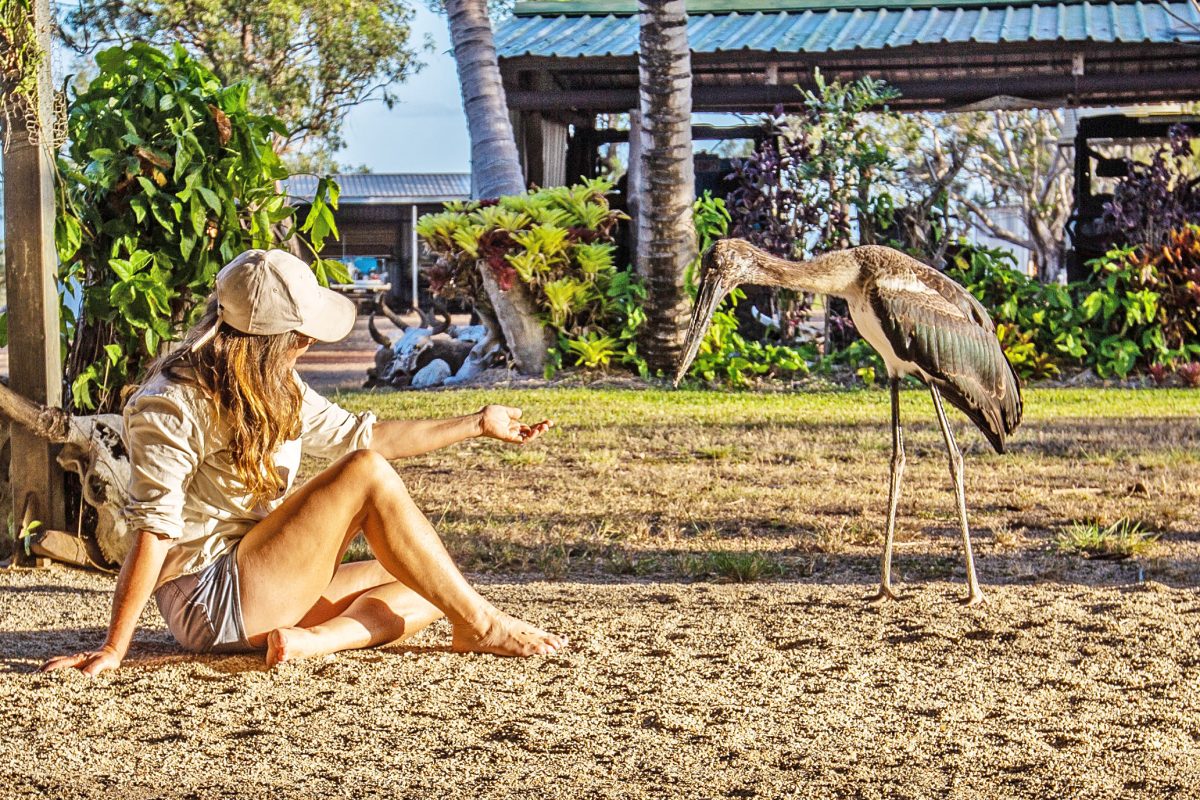
Fred the jabiru spent nine months living with Sally and Graham.
Although it was bittersweet driving out of Piccaninny for the last time on the weekend, the couple said they were looking forward to a good rest and catching up with family.
“I lost my father a year ago; my mum is getting on and Sally’s mum passed away while we were here, too,” Graham said.
“Family is always put on the backburner because we can’t get out and we can’t just get up and leave the property.
“It’ll be nice too to say let’s go out for dinner, or let’s go to the movies.”
Despite no longer having a permanent Cape York home, the red dirt has left its mark on the couple and they plan to travel back.
“Cape York does get under your skin,” Sally said.
“We feel very connected and while we are leaving Piccaninny, we won’t be leaving the Cape for good. Once you’ve been here for any length of time it’s very hard to leave.”
Graham and Sally said they were planning to move to their property near Ravenshoe, however Graham said winters would see them back up in Cape York, escaping the cold weather and visiting their long-time friends.
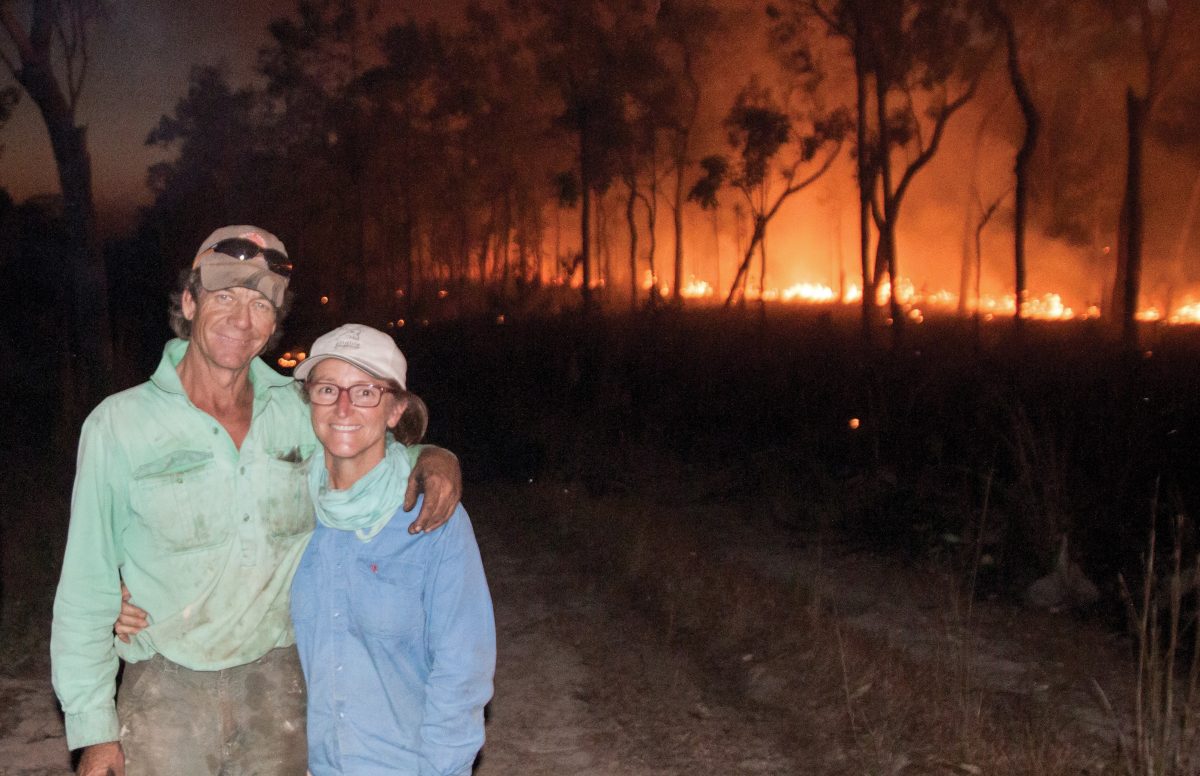
One thing Graham and Sally won’t miss is fighting late-season bushfires.


